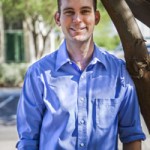Keeping the pace
Posted: June 21, 2013
It’s comforting to know your doctor understands exactly what you’re going through. That’s why Wilbur Freeman III, OMS II, decided to go back to school even though he loved his career as a biomedical engineer.
Freeman was no stranger to ATSU before starting medical school at SOMA. On two separate occasions, he worked as a research assistant on projects involving both ASDOH and ASHS. Between stints conducting research, he worked for St. Jude Medical, monitoring the implantation of pacemakers in patients who, like himself, have a congenital heart block.
At Freeman’s 6-month baby wellness check, doctors discovered the problem, and he has since been under the care of a cardiologist. He received his first pacemaker at age 9, and three pacemakers later, is following a newly realized dream of helping people with pacemakers as their physician.
Freeman worked for St. Jude Medical to help patients like himself. Part of his job included monitoring physicians as they implanted pacemakers and ensuring specifications set forth by the manufacturer were being met. Even though he loved what he was doing, he felt he could do more.
“I was just as integral as the surgeon putting in the pacemaker, but I felt limited,” says Freeman. “I felt like I had a big glass ceiling on top of me because I thought I could do his job and still be more effective at helping patients.”
After discussing options with his wife, Freeman decided to return to medical school to become a board certified cardiologist, implanting pacemakers. He plans to specialize as an electrophysiologist to work with the electricity of the heart.
Did you know? A pacemaker implantation takes 30 minutes or less and is less painful than pulling a tooth.
“I can connect with patients on a greater level because I have the same problem, and they would open up to me in ways they normally wouldn’t with the doctor,” Freeman says. “If there’s anything I can do to delay them from having surgery again, I will because I’m in the same boat.”
That’s why Freeman returned to ATSU—to make the biggest impact he can on people’s lives.
“I can be that person—the person who patients look at and say, ‘He’ll take care of me like he’s taking care of himself,’” says Freeman. “I want that relationship.”